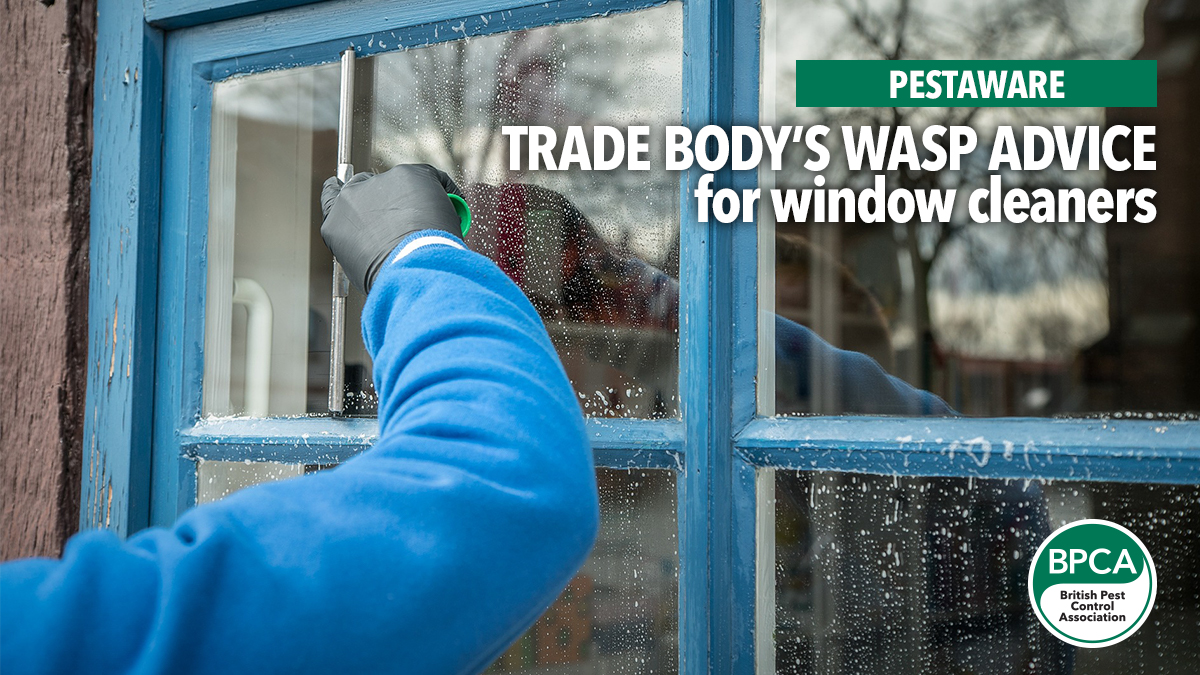PRESS RELEASE
Wasps can be a common hazard for window cleaners, particularly during the late summer months when a wasp colony is at its peak.
British Pest Control Association (BPCA), is encouraging members of the Federation of Window Cleaners to be aware of the dangers posed by wasps and understand when to seek help from a pest management professional.

How dangerous are wasps?
More than half of the UK is likely to be stung by an insect at some point in their lifetime.
Most stings cause pain, redness and swelling. A small percentage can cause anaphylaxis – an allergic reaction that can be fatal.
There are hundreds of stinging insects in the UK, but wasp and bee species are most likely to cause an allergic reaction.
Dr Andrew Whyte, a Consultant Allergist and Immunologist at Derriford Hospital, Plymouth, advises getting as much information as possible about a stinging insect, as the venom produced varies between species.
He said: “In adults, insect stings cause up to a quarter of cases of anaphylaxis, making it a very important public health issue particularly in those occupationally exposed to stings.”
People of any age, as well as house pets, can be stung and potentially have anaphylaxis.
Identifying a wasps’ nest
Commonly found under the eaves of houses, in wall cavities, sheds and garages, wasps’ nests are made from a material similar to papier-mâché.
Dee Ward-Thompson is Head of Technical at BPCA. She said: “Starting off around the size of a golf ball in early spring, a wasp nest will be home to a solitary queen and a few workers.
“But as the colony grows, hundreds of wasps build the nest, which can expand to the size of a beach ball to accommodate them all.
“Each one is a unique piece of architecture that is home to around 5,000 wasps during the peak activity of late summer.”
Tackle a wasp nest safely
Using DIY products such as sprays on a small nest in spring can nip potential wasp problems in the bud, but are unlikely to be effective against larger, established nests.
For a nest that has become a nuisance or public health risk, BPCA always advises using a pest management professional with the technical knowledge, protective equipment and access to professional-use insecticides needed to tackle a wasp nest safely.
When threatened, social wasps can emit a pheromone which acts as a distress call to other wasps in the colony and triggers a defensive stinging frenzy.
You’ll see all sorts of DIY nest removal guides online. They’re all very dangerous and not recommended by BPCA.
Dee Ward-Thompson
Dee added: “If you scare a wasp, it might call for backup. While being stung by one wasp isn’t usually dangerous, multiple stings could cause you serious hard and in some extreme cases, can even be fatal.
“One nest can produce 3,000-8,000 wasps in a year, so although an insect spray will quickly kill any wasps you hit in flight, the sheer number of wasps per nest means this is probably a waste of time.
“You’ll see all sorts of DIY nest removal guides online. They’re all very dangerous and not recommended by BPCA.
“We always advise seeking help from a professional when dealing with nuisance wasp nests.”
Not every wasps’ nest needs destroying. If it’s in a low-traffic area it could be best to just leave it alone. Wasps are accidental pollinators, and they themselves are pest controllers - eating small flies and aphids.
Wasps can become aggressive in late summer, but will abandon the colony in the autumn - at which point empty nests can be safely removed.
Why not find a trusted pest controller to partner with this summer using the BPCA’s Find a pest controller tool at bpca.org.uk/find. All BPCA members are trained and insured. You may even be able to negotiate a referral fee.
WANT TO KNOW MORE ABOUT WASPS?
For more information visit bpca.org.uk/wasps
Source: Online